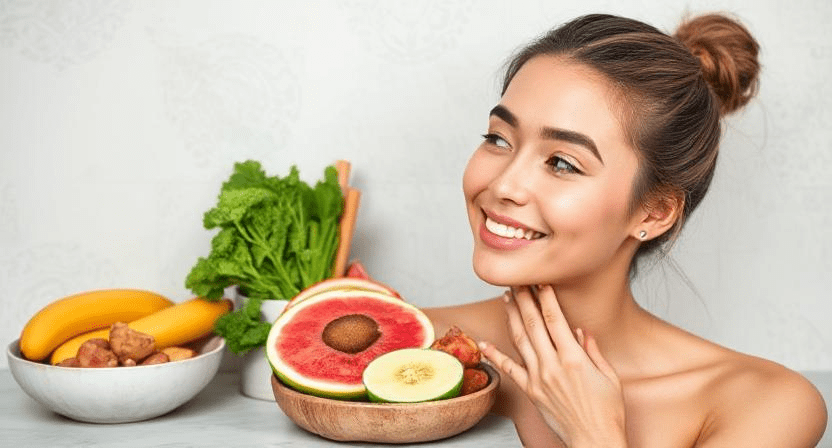

How an Anti-Inflammatory Diet Can Solve Your Skin Problems


Arya Soleil
Inflammation is the root cause of many chronic health conditions, including skin issues. The food we eat plays a crucial role in either fueling or reducing inflammation in the body. Adopting an anti-inflammatory diet can help manage and even prevent various skin issues, leading to clearer, healthier skin. In this blog, we will explore how an anti-inflammatory diet benefits the skin and what common skin problems it can help address.
The Connection Between Diet and Skin Health
Your skin reflects your internal health. A diet high in processed foods, refined sugars, and unhealthy fats can trigger systemic inflammation, leading to breakouts, dryness, and other skin concerns. On the other hand, an anti-inflammatory diet rich in whole, nutrient-dense foods can help reduce inflammation, improve skin texture, and enhance overall skin health.
Common Skin Issues That Can Benefit from an Anti-Inflammatory Diet
1. Dryness
Dry skin can be caused by dehydration, environmental factors, and a lack of essential nutrients. Consuming healthy fats, omega-3 fatty acids, and hydrating foods like cucumbers and watermelon can help maintain moisture levels and improve skin elasticity.
2. Dullness
A lack of essential vitamins and antioxidants can lead to dull, tired-looking skin. Brightly colored fruits and vegetables, rich in vitamins A, C, and E, can enhance skin radiance and promote a healthy glow.
3. Sensitivity
Skin that is prone to irritation and redness may be reacting to inflammatory foods. Reducing processed foods, alcohol, and excessive caffeine while increasing anti-inflammatory foods like turmeric, ginger, and green tea can help calm the skin.
4. Oiliness
Excess oil production can lead to clogged pores and breakouts. A diet high in refined sugars and unhealthy fats may exacerbate oiliness, while whole grains, lean proteins, and fiber-rich foods can help regulate sebum production.
5. Uneven Skin Tone
Inflammation and oxidative stress can contribute to hyperpigmentation and an uneven complexion. Consuming antioxidant-rich foods such as berries, citrus fruits, and leafy greens can help repair skin and promote an even skin tone.
6. Severe Skin Problems
Certain chronic and severe skin issues may also benefit from an anti-inflammatory diet:
Eczema – Characterized by itchy, inflamed skin, eczema can be exacerbated by processed foods and allergens. Anti-inflammatory foods like fatty fish, leafy greens, and probiotics may help reduce flare-ups.
Psoriasis – An autoimmune condition that leads to scaly, inflamed patches of skin. Anti-inflammatory foods such as turmeric, berries, and green tea can help lower inflammation and alleviate symptoms.
Rosacea – A condition that causes redness and visible blood vessels on the face. Avoiding triggers like alcohol and spicy foods while increasing anti-inflammatory foods can help minimize symptoms.
Severe Acne – Chronic, cystic acne is often linked to high-glycemic diets and inflammation. A diet rich in omega-3 fatty acids, fiber, and antioxidants can help balance hormones and reduce breakouts.
Best Foods for an Anti-Inflammatory Diet
1. Fruits and Vegetables
Berries (blueberries, strawberries, raspberries)
Leafy greens (spinach, kale, Swiss chard)
Bell peppers, tomatoes, and carrots (rich in antioxidants and vitamins)
2. Healthy Fats
Avocados
Extra virgin olive oil
Nuts and seeds (almonds, walnuts, flaxseeds, chia seeds)
3. Omega-3 Fatty Acids
Fatty fish (salmon, mackerel, sardines)
Chia seeds and flaxseeds
Walnuts
4. Whole Grains
Quinoa
Brown rice
Oats
5. Herbs and Spices
Turmeric (powerful anti-inflammatory properties)
Ginger
Cinnamon
6. Probiotic and Fermented Foods
Yogurt (unsweetened)
Kimchi
Sauerkraut
Kombucha
Foods to Avoid
To reduce inflammation and improve skin health, it’s best to limit:
Processed foods and refined sugars
Dairy (for some individuals)
Fried and greasy foods
Alcohol
Artificial additives and preservatives
Additional Tips for Healthy Skin
Stay Hydrated – Drink plenty of water to flush out toxins and maintain skin hydration.
Get Enough Sleep – Poor sleep increases stress and inflammation, leading to breakouts and premature aging.
Manage Stress – Chronic stress triggers inflammation; practice meditation, yoga, or deep breathing.
Exercise Regularly – Physical activity boosts circulation, delivering essential nutrients to the skin.
Conclusion
An anti-inflammatory diet is a natural and effective way to improve skin health and manage common and severe skin issues. By nourishing your body with wholesome, anti-inflammatory foods, you can achieve clearer, healthier, and more radiant skin. Small dietary changes can make a significant impact, leading to long-term skin benefits. Start incorporating anti-inflammatory foods into your diet today and experience the transformation!
Recommended Reads

- March 22, 2025
Anti-Inflammatory Breakfasts: Easy Recipes to Start Your Day Right
Home News Healthy Habits & Lifestyle Health Conditions &...


- March 22, 2025
Questioning the FDA: A Deeper Look at the Food and Drug Administration’s Role
Home News Healthy Habits & Lifestyle Health Conditions &...


- March 22, 2025
Make ‘Raw Milk’ Just ‘Milk’ Again: A Closer Look at the Raw Milk Debate
Home News Healthy Habits & Lifestyle Health Conditions &...


- March 22, 2025
The Power of Sweet Potatoes: A Superfood for Eyes, Skin, and Beyond
Home News Healthy Habits & Lifestyle Health Conditions &...


- March 22, 2025
Sugar-Free: A Code Word for “We’ve Replaced It with Something Worse for You”
Home News Healthy Habits & Lifestyle Health Conditions &...


- March 22, 2025
The Evolution of Food: How Modern Diets Are Fueling Chronic Disease
Home News Healthy Habits & Lifestyle Health Conditions &...

How an Anti-Inflammatory Diet Can Solve Your Skin Problems

Inflammation is the root cause of many chronic health conditions, including skin issues. The food we eat plays a crucial role in either fueling or reducing inflammation in the body. Adopting an anti-inflammatory diet can help manage and even prevent various skin issues, leading to clearer, healthier skin. In this blog, we will explore how an anti-inflammatory diet benefits the skin and what common skin problems it can help address.
The Connection Between Diet and Skin Health
Your skin reflects your internal health. A diet high in processed foods, refined sugars, and unhealthy fats can trigger systemic inflammation, leading to breakouts, dryness, and other skin concerns. On the other hand, an anti-inflammatory diet rich in whole, nutrient-dense foods can help reduce inflammation, improve skin texture, and enhance overall skin health.
Common Skin Issues That Can Benefit from an Anti-Inflammatory Diet
1. Dryness
Dry skin can be caused by dehydration, environmental factors, and a lack of essential nutrients. Consuming healthy fats, omega-3 fatty acids, and hydrating foods like cucumbers and watermelon can help maintain moisture levels and improve skin elasticity.
2. Dullness
A lack of essential vitamins and antioxidants can lead to dull, tired-looking skin. Brightly colored fruits and vegetables, rich in vitamins A, C, and E, can enhance skin radiance and promote a healthy glow.
3. Sensitivity
Skin that is prone to irritation and redness may be reacting to inflammatory foods. Reducing processed foods, alcohol, and excessive caffeine while increasing anti-inflammatory foods like turmeric, ginger, and green tea can help calm the skin.
4. Oiliness
Excess oil production can lead to clogged pores and breakouts. A diet high in refined sugars and unhealthy fats may exacerbate oiliness, while whole grains, lean proteins, and fiber-rich foods can help regulate sebum production.
5. Uneven Skin Tone
Inflammation and oxidative stress can contribute to hyperpigmentation and an uneven complexion. Consuming antioxidant-rich foods such as berries, citrus fruits, and leafy greens can help repair skin and promote an even skin tone.
6. Severe Skin Problems
Certain chronic and severe skin issues may also benefit from an anti-inflammatory diet:
Eczema – Characterized by itchy, inflamed skin, eczema can be exacerbated by processed foods and allergens. Anti-inflammatory foods like fatty fish, leafy greens, and probiotics may help reduce flare-ups.
Psoriasis – An autoimmune condition that leads to scaly, inflamed patches of skin. Anti-inflammatory foods such as turmeric, berries, and green tea can help lower inflammation and alleviate symptoms.
Rosacea – A condition that causes redness and visible blood vessels on the face. Avoiding triggers like alcohol and spicy foods while increasing anti-inflammatory foods can help minimize symptoms.
Severe Acne – Chronic, cystic acne is often linked to high-glycemic diets and inflammation. A diet rich in omega-3 fatty acids, fiber, and antioxidants can help balance hormones and reduce breakouts.
Best Foods for an Anti-Inflammatory Diet
1. Fruits and Vegetables
Berries (blueberries, strawberries, raspberries)
Leafy greens (spinach, kale, Swiss chard)
Bell peppers, tomatoes, and carrots (rich in antioxidants and vitamins)
2. Healthy Fats
Avocados
Extra virgin olive oil
Nuts and seeds (almonds, walnuts, flaxseeds, chia seeds)
3. Omega-3 Fatty Acids
Fatty fish (salmon, mackerel, sardines)
Chia seeds and flaxseeds
Walnuts
4. Whole Grains
Quinoa
Brown rice
Oats
5. Herbs and Spices
Turmeric (powerful anti-inflammatory properties)
Ginger
Cinnamon
6. Probiotic and Fermented Foods
Yogurt (unsweetened)
Kimchi
Sauerkraut
Kombucha
Foods to Avoid
To reduce inflammation and improve skin health, it’s best to limit:
Processed foods and refined sugars
Dairy (for some individuals)
Fried and greasy foods
Alcohol
Artificial additives and preservatives
Additional Tips for Healthy Skin
Stay Hydrated – Drink plenty of water to flush out toxins and maintain skin hydration.
Get Enough Sleep – Poor sleep increases stress and inflammation, leading to breakouts and premature aging.
Manage Stress – Chronic stress triggers inflammation; practice meditation, yoga, or deep breathing.
Exercise Regularly – Physical activity boosts circulation, delivering essential nutrients to the skin.
Conclusion
An anti-inflammatory diet is a natural and effective way to improve skin health and manage common and severe skin issues. By nourishing your body with wholesome, anti-inflammatory foods, you can achieve clearer, healthier, and more radiant skin. Small dietary changes can make a significant impact, leading to long-term skin benefits. Start incorporating anti-inflammatory foods into your diet today and experience the transformation!
Recommended Reads

- March 22, 2025
Anti-Inflammatory Breakfasts: Easy Recipes to Start Your Day Right
Home News Healthy Habits & Lifestyle Health Conditions &...


- March 22, 2025
Questioning the FDA: A Deeper Look at the Food and Drug Administration’s Role
Home News Healthy Habits & Lifestyle Health Conditions &...


- March 22, 2025
Make ‘Raw Milk’ Just ‘Milk’ Again: A Closer Look at the Raw Milk Debate
Home News Healthy Habits & Lifestyle Health Conditions &...


- March 22, 2025
The Power of Sweet Potatoes: A Superfood for Eyes, Skin, and Beyond
Home News Healthy Habits & Lifestyle Health Conditions &...


- March 22, 2025
Sugar-Free: A Code Word for “We’ve Replaced It with Something Worse for You”
Home News Healthy Habits & Lifestyle Health Conditions &...


- March 22, 2025
The Evolution of Food: How Modern Diets Are Fueling Chronic Disease
Home News Healthy Habits & Lifestyle Health Conditions &...



